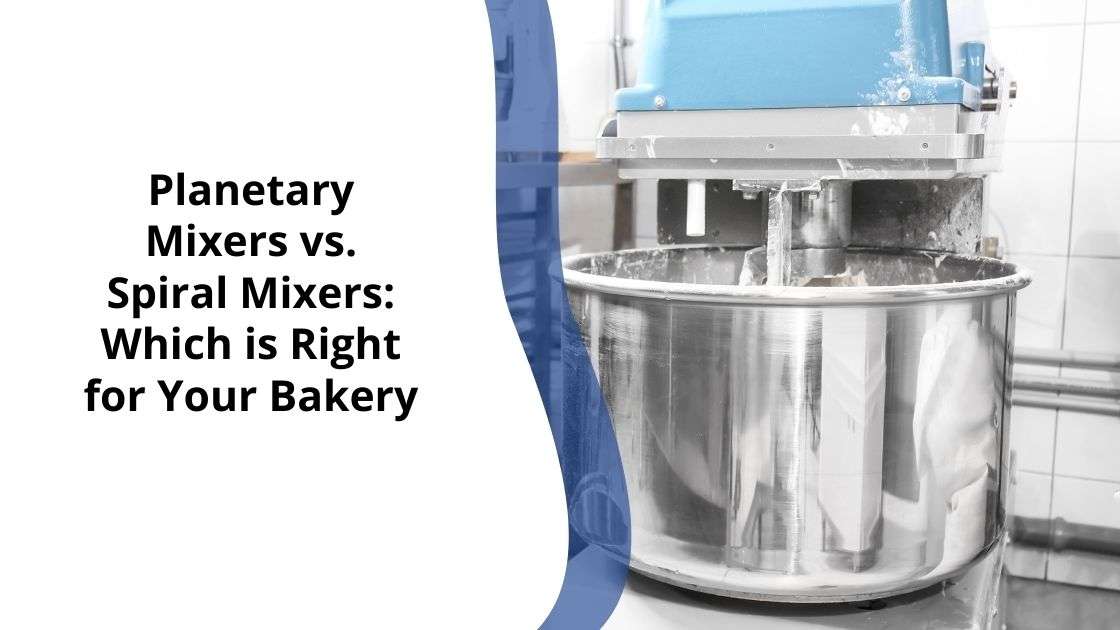
Feb 7,2024
Bakery products vary, ranging from pastries and cakes to biscuits, muffins, and pizza crusts. Although the quality of materials and ingredients matters a lot, the uniformity of the cake mix is also essential for a tasty treat.
A baker's commercial mixture should match the needs of the kitchen. This will boost the kitchen's productivity and require less money on maintenance, repairs, and other expenses. This blog will explore the differences between spiral and planetary mixers and how each suits different bakery products.
A commercial mixer is a must have equipment for a bakery. However, before purchasing the mixer, the baker should have a solid plan for what types of confectionary and desserts he will make frequently. He should know the kind of cake mix or dough that will be needed and the consistency of the dough.
Another significant factor to consider in selecting a suitable mixer is the ingredients' volume and weight. Purchasing a mixture that is too small means that the bakery will struggle to keep up with the pace of the demand, and a mixer of a considerable size would result in handling problems.
The baker should also know if he would be using the mixer only for dough or if he would be mixing other ingredients like spices or sauces or making a stock for a dish. Without a clear idea of the application of the machine, purchasing a sophisticated piece of machinery like a mixer is futile.
Planetary and spiral models are the most widely recognized options among commercial mixers in the bakery industry. Yet, many bakers might not fully appreciate the numerous distinctions between these two mixer types. Bakers must grasp these disparities to choose the best mixer for their kitchens and production needs.
If your goal is versatility and thorough kneading, then a planetary mixer is the way to go. Conversely, a spiral misto is the superior choice when creating artisanal and lighter dough.
The planetary mixer machine opens possibilities for bakers who love experimenting with culinary creations. These mixers aren't just fantastic for blending cookie ingredients and tackling heavy dough – they can do so much more, like slicing veggies, cutting meat, grating cheese, making batter, and whipping up fluffy meringues. This versatility empowers bakers to offer a broader range of treats beyond cookies and bread.
You'll need the right attachments and agitators to make the most of these mixes. For traditional bowl mixing, you'll find tools like whips, beaters, dough hooks, mixing paddles, whisks, and pastry mixing. But here's the cool part – some planetary mixers come with hub attachments, such as slicers, graters, shredders, and meat choppers. These attachments take your mixer's capabilities up a notch, allowing it to do more than just mixing.
Regarding sizes, planetary mixers come in various capacities, measured by how many ingredients they can hold in their bowls. You'll find options ranging from five to 140 quarts, which adds to their flexibility.
The larger ones stand tall on the floor, while the smaller ones sit neatly on your countertop. Planetary mixers are an excellent fit for all-purpose kitchens, bakeries, and even pizzerias, making them the most popular choice among commercial mixers today.
What sets spiral mixers apart is the way they handle the dough. Rotating the bowl in both directions ensures the dough comes out consistently well-mixed. So, if you're all about maintaining top-notch dough quality, spiral mixers are your go-to choice. They're also great for working with smaller batches compared to planetary mixers.
One handy feature of spiral mixers is how they keep the dough temperature in check when mixing bread. The spiral hook's motion prevents overheating or premature fermentation, which could mess up the yeast's role in the dough. Temperature control is vital when aiming for the perfect artisanal bread with a slow, meticulous fermentation process.
Thanks to a pulley system, spiral mixers do their job quietly, unlike the somewhat noisy planetary mixers. Plus, cleaning up is a breeze with the dual rotation – reverse the bowl to get the dough off the hook after a long day in the kitchen.
Moreover, these mixers are pros at achieving the right dough consistency by effortlessly blending flour and water, which is crucial, especially for bread that requires a higher water absorption ratio. This results in more digestible bread and saves bakers money by using less flour and more water for the same amount of dough, making it lighter and airier.
Your kitchen space, mixing requirements, and production v are crucial when you're in the market for an evaluation. You also want to think ahead and consider any potential growth. In some situations, having planetary and spiral mixers in your kitchen arsenal might be brilliant.
And suppose you're the kind of baker who wants to spread their wings beyond just making specialty bread and baked goods. In that case, the combo of a planetary mixer and a spiral mixer can amp up your daily operations, allowing you to explore a broader range of culinary creations.